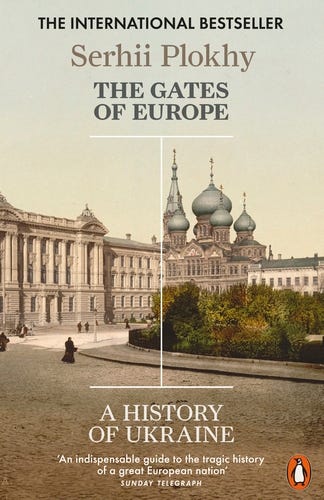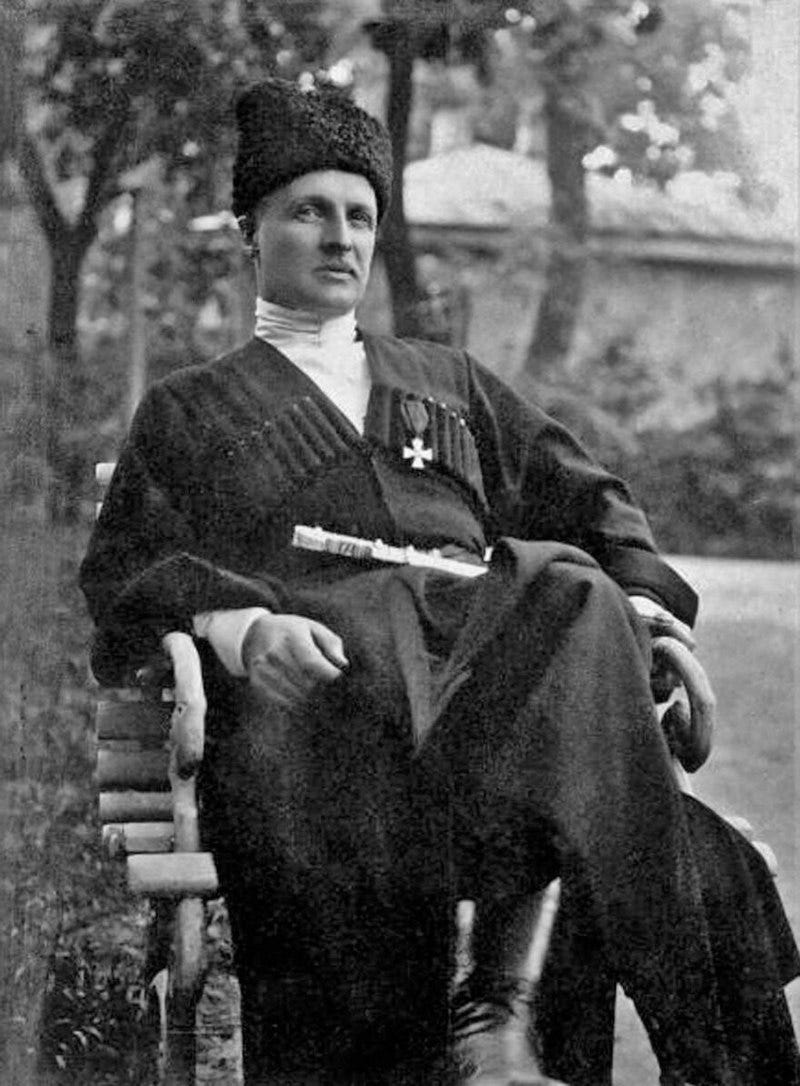Germany and Ukraine: A History - Part I
My interview with the historian Serhii Plokhy
‘Ukrainians probably have just as much right to brag about their role in changing the world as Scots and other nationalities about which books have been written,’ says the Ukrainian historian Serhii Plokhy in his excellent history of his home country The Gates of Europe.
Ukraine has indeed left its mark on European history and vice versa. It has been a bridge between Europe and Eurasia, a meeting place between empires and a product of conflict, shifting frontiers and its own multi-ethnic makeup.
Ukraine’s emergence as a nation is also intricately intertwined with the histories of other European countries and that includes Germany whose views on Ukrainian nationhood have often been determined by its relations with Russia. It’s a long and complex relationship and a crucial one at this moment in time. Yet it is one that is little understood.
Few people are better placed to explain and discuss the matter than Serhii Plokhy whom I had a chance to speak to earlier this week. A professor of history at Harvard University, he also directs its Ukrainian Research Institute. He's the author of several bestselling books, including Chernobyl: History of a Tragedy, which won the Baillie Gifford Prize, and The Russo-Ukrainian War: The Return of History.
This is Part I of our conversation, covering Germany and Ukraine, 1918 to 1945.
Part II will follow soon.
Hoyer: Hello, Serhii! It’s great to have you here to talk about Germany and Ukraine.
Plokhy: Thank you for inviting me, Katja.
Hoyer: I think we share a belief that it is important to understand history in order to understand the present. The German-Ukrainian relationship has come under a lot of scrutiny recently due to the Russo-Ukrainian War, but it goes back a long way. So let’s start with the first formal Ukrainian state that emerged at the end of the First World War. Can you tell us a little bit more about that? How did the cause for Ukrainian independence become intertwined with Germany’s response to it?
Plokhy: This has to be seen in the context of World War One. In 1918, the last year of the war, a number of independent states emerged on the border of the Russian Empire and one of them was Ukraine. Initially, there had been a desire for a form of federation of which both Russia and Ukraine would be constituent parts. But Lenin’s Russia waged war on Ukraine, which put it in desperate need of allies. The most natural ally seemed to be Germany as it was at war with Russia. So the issue became part of the peace negotiations given that only an independent state could take part in those. So the name ‘Germany’ is writ large upon the history of the first declaration of Ukrainian independence in 1918.
Hoyer: What did Germany and Ukraine each get out of this relationship?
Plokhy: Ukraine already had a reputation as the ‘breadbasket of Europe’. German commanders were interested in the food supplies that Ukraine could provide. Ukraine in turn needed military assistance against Bolshevik aggression. The relationship was not trouble-free. The Germans didn’t like the socialist-leaning Ukrainian government and so it was removed and a more conservative one under Pavlo Skoropadskyi was installed. German occupation may not have been something to be excited about but it provided stability and a space for Ukrainian institutions to be set up. There was a flurry of that in 1918. For example, the Ukrainian Academy of Sciences, a number of universities and the National Library were established. The main desire was to be independent from Russia and that’s what the German military could provide.
Hoyer: But this arrangement was not very long-lived…
Plokhy: No, the socialist leaders who had been removed from power launched an uprising against the Skoropadskyi regime, which was no longer backed by Germany once it had removed its troops at the end of World War One. So Skoropadskyi went into exile in Germany from where he continued to promote the idea of an independent but multi-ethnic Ukraine that could be home not just to Ukrainians but also to minorities like Russians, Jews and others. It continued to be an important idea.
Hoyer: When the Soviet Union was set up in 1922, a large chunk of Ukraine became a part of it.
Plokhy: Yes, but the country as a whole was split between four countries after World War One: the biggest chunk went to Russia and became part of the Soviet Union. But there were parts of Ukraine that went to Poland, Romania and Czechoslovakia and the dynamic was different in each state. In Soviet Ukraine, after Holodomor, the Great Ukrainian Famine of 1932-33, the political elite had no autonomy whatsoever. Meanwhile, the western parts of Ukraine in the other countries saw a rise of radical nationalism. These movements were looking to Germany and Italy for ideological models to follow and political alliances. Germany in turn was keen to weaponise radical nationalism in the countries it sought to conquer and break up, particularly Poland and Czechoslovakia in 1939.
Hoyer: Was it no concern that Hitler’s vision for Lebensraum for his German state in Eastern Europe also included Ukraine? His interests were hardly aligned with those of the radical Ukrainian nationalists.
Plokhy: No, that’s right. The Ukrainian nationalists and the German Nazi regime were on a collision course. Hitler wanted to take Ukrainian land, resettle and colonise it while expelling indigenous populations. The nationalists wanted to create an independent Ukrainian state. These aims clashed. For instance, one of the radical nationalist groups, led by Stepan Bandera, declared an independent Ukraine when the Nazis entered Lwów, now Lviv in Western Ukraine. But they were soon rounded up and arrested. Bandera and others were sent to Sachsenhausen concentration camp. Whatever alliance existed between the Nazis and Ukrainian nationalists broke down. They had very different visions of what Ukraine was supposed to be: the Germans wanted Lebensraum, Bandera and the radical nationalists wanted an independent Ukrainian state.

Hoyer: Ukraine ended up becoming one of the main battlegrounds of the war. It’s always struck me as odd that some Germans today argue sending weapons to a state that fights Russian aggression is wrong because Germany did terrible things to the Russian people during the Second World War. There seems to be a lesser degree of empathy and understanding when it comes to the bloodshed Hitler’s war caused in Eastern Europe, including Ukraine?
Keep reading with a 7-day free trial
Subscribe to ZEITGEIST to keep reading this post and get 7 days of free access to the full post archives.




